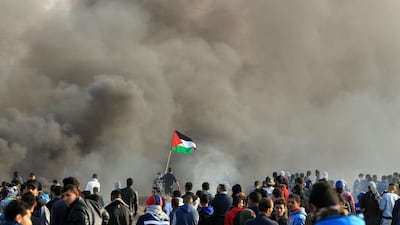Israeli troops shot and wounded more than 40 Palestinians in Gaza and the occupied West Bank on Friday as thousands of Palestinians took part in fresh protests against Washington's controversial recognition of Jerusalem as Israel's capital.
Near the Palestinian city of Ramallah in the West Bank, Israeli police troopers said they shot a man after he stabbed and hurt one of their unit.
Medical officials said three more Palestinians were shot and wounded in the West Bank. A further 38 were wounded on the border of the Gaza Strip.
Four Palestinians have been killed and more than 1,000 wounded so far, according to the Palestinian health ministry.
US president Donald Trump's December 6 announcement that he would break with decades of American policy and move his embassy to Jerusalem has stirred international condemnation, as well as protests across the Palestinian territories and Arab world.
Protesters have burned American and Israeli flags and trampled on pictures of Mr Trump. But concerns that the decision would lead to a major wave of bloodshed have as yet not materialised.
In the occupied West Bank, a few thousand people gathered in the southern city of Hebron, as well as Nablus in the north, with clashes near the Al Arroub camp, south of Bethlehem.
In Jerusalem itself, around 30,000 people prayed at the Al Aqsa mosque, the third holiest site for Muslims, the Islamic organisation that administers the site said.
The vast majority left without incident, but small scuffles broke out in Jerusalem's Old City, which contains sites holy to Muslims, Christians and Jews..
The status of Jerusalem is one of the most controversial issues in the Israeli-Palestinian conflict.
Israel seized control of the eastern part of the city in the 1967 Arab-Israeli war and claims the whole of Jerusalem as its undivided capital, while the Palestinians want East Jerusalem as the capital of their future state.
For decades global powers have avoided taking an opinion, keeping their embassies in Tel Aviv instead.
Mr Trump declared, however, that he would move the embassy and recognised the city as Israel's capital.
Amid condemnation from much of the international community, the Palestinians have announced they will no longer view the Americans as mediator in negotiations with the Israelis.
A poll conducted after Mr Trump's announcement by the respected Palestinian Centre for Policy and Survey Research found 45 per cent of Palestinians supported a violent popular uprising, up from 35 per cent three months earlier.
Khalil Shikaki, the centre's director, said the "only possible explanation" for the increase was Mr Trump's decision.
He said, however, the effectiveness of the Israeli forces and the Palestinian security forces' ongoing security co-operation with them had ensured the protests in the West Bank remained relatively minor in scale.
While angered by Mr Trump's declaration, Palestinian president Mahmoud Abbas has not instructed his party Fatah or security forces to cut ties with Israel.
"Hamas is too weak in the West Bank to carry out any serious attacks [and] Fatah does not want to engage in violence," Mr Shikaki said.
"This is not likely to change any time soon."
In Gaza, sealed off by Israel and Egypt, at least 12 rockets or mortars have been fired from the territory since Mr Trump's announcement, with Israel hitting at least 10 sites in reply.
But the response has been relatively muted compared to some of the warnings, said Ofer Zalzberg, Israel-based analyst with the International Crisis Group think tank.
He said the lack of serious blowback to Mr Trump's announcement had encouraged right-wingers in Israel's government to question whether "maybe other things that people said were impossible are not".
Protests against the US move were also held in Amman and Berlin on Friday.

